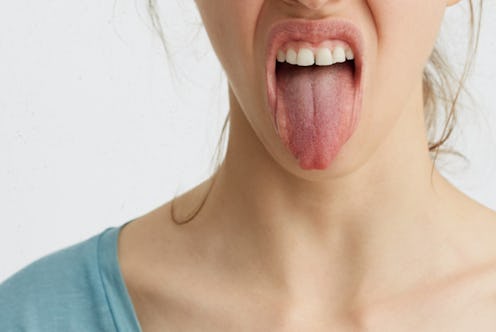Life
This Woman Got “Black Hairy Tongue” After Taking Antibiotics

A woman from Missouri was diagnosed with a rare oral condition after being admitted to the hospital with car crash injuries last year. According to a case report published in the New England Journal of Medicine, the 55-year-old suffered severe injuries to her legs, and after doctors gave her oral and intravenous antibiotics to stave off infection, she complained of some strange symptoms — namely, a condition called "black hairy tongue." In a bizarre reaction to her antibiotic treatments, the patient first complained of nausea and a strange taste in her mouth. After giving her an oral exam, doctors discovered that she had developed a medical condition in which it appears that a person’s tongue is covered in thick black hair.
Women’s Health reports that while black hairy tongue looks pretty grim, it’s actually totally harmless and painless — and there are no long-term negative health effects associated with it. Causes can range from antibiotic and radiation treatments, to smoking and dehydration, but the condition usually resolves on its own. In this case, the Missouri woman was taken off the antibiotic causing the oral reaction, and was put on another treatment for her infection. Women’s Health also notes that medicated mouthwashes, antifungal treatments, and retinoid formulas are also sometimes used to clear up black hairy tongue, but it can also clear up on its own.
Study author Yasir Hamad, MD, an assistant professor in the Department of Internal Medicine at the Washington University School of Medicine in St. Louis, told The Washington Post that black hairy tongue is way more common than you'd think — it actually affects up to 13 percent of the population. He further noted that this is the first case of black hairy tongue he’s seen in his 10 years of practice, but that it was a “classic, textbook case.”
According to the case study, black hairy tongue is a benign condition in which a buildup of dead skin cells (not actual hair) on the surface of the tongue causes it to look, well, black and hairy. The Mayo Clinic further reports that other symptoms of black hairy tongue include discoloration that can also look brown, green, yellow, or white, a furry or hairy appearance on the surface of the tongue, a strange or metallic taste in the mouth, or a tickling sensation. Gizmodo also reports that black hairy tongue is not totally uncommon, but that it usually appears yellow, and not the super alarming black like in this case.
Gizmodo further notes that it’s not exactly clear why certain antibiotic treatments cause black hairy tongue, but that it might be due to bacterial changes in the mouth. Fortunately, the Missouri patient’s tongue returned to its normal pinkish hue within four weeks after she was taken off her antibiotic treatment, according to the case study.
If you develop any of the symptoms of black hairy tongue, definitely don’t panic — but check in with your doctor if it doesn’t clear up with brushing your tongue and teeth twice a day. Further treatments include quitting smoking and reducing coffee and black tea consumption, and also avoiding any other foods or drinks that might be contributing to the condition.